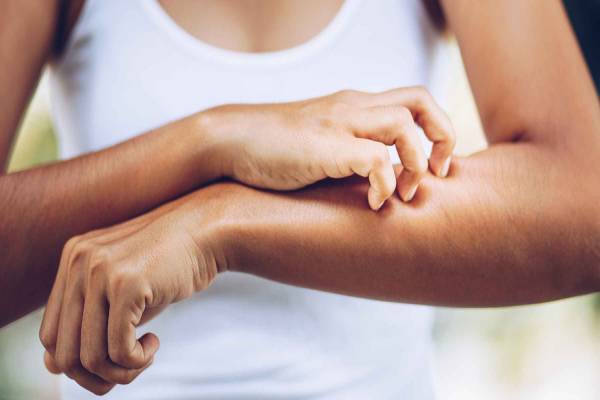9 Main Causes Of Itchy Body: (What To Do)
Itching on the body occurs due to skin irritation or inflammation, as in the case of dry skin, sweat allergy or insect bites. Itchy skin can also be caused by a fungal, viral or bacterial infection, or be due to psychological illnesses, such as anxiety or depression, for example, which can affect a specific part of the body or the entire body.
Depending on its cause, itching on the body may be accompanied by other symptoms, such as redness, formation of blisters, spots or wounds on the skin, which can also be formed by frequent scratching.

In the presence of itching on the body, it is important to always consult a dermatologist, or a general practitioner, to assess the characteristics of the itching, what may have caused it, the location in which it appears and whether it is accompanied by other symptoms and, therefore, be diagnosed and started the most appropriate treatment, which can be done with the use of anti-allergy medicines or the use of moisturizing creams, for example.
Causes of itchy body
The main causes of itchy body are:
1. Allergic reactions
Allergic reactions can cause intense itching, which may be accompanied by other symptoms such as the formation of small red or white blisters, crusts or sores on the skin.
Itchy skin caused by allergic reactions can occur anywhere on the body and is caused by skin irritation or inflammation, the most common causes being:
- Excessive heat or sweat;
- Bug bite;
- Fabrics;
- Cosmetics, such as soaps, creams and shampoos;
- Cleaning products;
- Animal or plant hair;
- Foods;
- Allergic reaction to medications;
- Dust or mites from clothes, books and upholstery.
The allergy can appear isolated or occur frequently in people who are prone to allergies, and the episodes can be mild or severe, requiring treatment with an immunoallergologist.
What to do: it is recommended that the area be washed with plenty of cold water and neutral soap, and it is important to avoid contact with the irritating substance, food or object. In addition, treatment can be carried out with antiallergic drugs or corticosteroids applied directly to the skin or taken in pill form, as per medical advice.
In more serious cases, it is necessary to go to an emergency room, as injectable medications may be necessary.
2. Dry skin
Dry skin, called cutaneous xerosis, is mainly caused by the excessive use of soap, very hot and long baths, or due to aging skin that becomes thinner and loses its ability to produce oil and retain natural hydration, which which can cause constant itching, in addition to other symptoms such as irritation, peeling or even cracked skin. This type of itching is most common on the legs, arms or belly.
Other causes of dry skin may include the use of some medications, such as drugs to lower cholesterol, opioids or diuretics, for example, as well as situations such as dehydration, living in cold regions with low humidity, and even certain diseases that can cause changes in skin keratinization.
What to do: you should avoid taking very hot baths, using humidifiers in the environment and using hypoallergenic soaps, as well as moisturizing creams that contain ceramides, glycolic acid, vitamin E or urea, for example. The ideal is to consult a dermatologist to recommend the best moisturizing cream according to your skin type.
3. Dermatitis
Dermatitis is an inflammatory skin disease, generally of genetic or autoimmune cause, in which there is a chronic allergic process, which causes constant and intense itching, and may be accompanied by other skin changes.
Some of the most common forms of dermatitis include:
- Atopic dermatitis: most common in the folds of the arms and knees in children, and may also appear on the cheeks and ears of babies, or on the neck, hands and feet of adults, and be accompanied by redness, peeling or swelling of the skin;
- Seborrheic dermatitis: causes redness or peeling of the skin, especially on the scalp, and oily regions of the skin such as the sides of the nose, ears, beard, eyelids and chest, causing itching, blemishes and peeling of the skin;
- Contact dermatitis: causes intense itching accompanied by blisters and redness, swelling and peeling, in areas of the skin that have been in direct contact with an irritating substance, such as jewelry or cosmetics, for example;
- Dermatitis herpetiformis: causes an inflammatory reaction that causes intense itching, accompanied by small blisters on the skin, similar to lesions caused by herpes, and can appear on the scalp, butt, elbows, knees and back, being more common in people with gluten intolerance or celiac disease;
- Psoriasis: is a chronic skin disease that causes inflammation and intense multiplication of cells in the most superficial layer of the skin, causing red, dry patches that cause itching, a burning sensation or pain;
- Moth dermatitis or Hylesia dermatitis: occurs due to the release of bristles by the Hylesia moth species, which penetrate deeply into the skin and can remain for days to weeks, leading to the development of symptoms such as intense itching of the skin and local redness. In this type of dermatitis, the itching occurs mainly at night, as this moth has a nocturnal habit, releasing its bristles during flight, and direct contact with the moth is not necessary to result in symptoms.
Other rarer examples of skin changes that cause itching include luminal or bullous dermatitis, as well as other dermatological diseases such as bullous pemphigoid, mycosis fungoides and lichen planus, for example.
What to do: you should consult a dermatologist to assess the characteristics of the lesions and, thus, be advised on treatment according to each type of dermatitis, which may include urea-based moisturizing creams, corticosteroid or anti-allergy medications, for example. example.
4. Skin infections
Skin infections can be caused by fungi, bacteria or parasites, causing lesions and inflammatory reactions, and the appearance of itchy skin, which can occur in different parts of the body, depending on the type of microorganism that caused the infection.
Some of the most common infections are:
- Skin mycoses: causes itching, redness and peeling of the skin, and can affect any region of the body, which arises due to fungal infections, as in the case of Ringworm, Onychomycosis, Intertrigo and Pityriasis Versicolor;
- Cutaneous candidiasis: caused by an infection with the Candida fungus, causing itchy skin, reddish and moist lesions, most common in the folds of the body, such as under the breasts, groin, armpits, nails or between the fingers, although it can occur anywhere on the body;
- Scabies: also known as scabies, this disease is caused by the Sarcoptes scabiei mite, which causes intense itching and reddish bumps, and is quite contagious;
- Herpes: infection with the herpes virus causes redness and small blisters, which can be itchy or painful, and are common on the lips and genital region;
- Impetigo: skin infection caused by bacteria that cause the appearance of small wounds that contain pus and form crusts.
These infections can be transmitted from one person to another, and usually arise due to poor hygiene habits or when immunity drops.
What to do: the treatment must be guided by the doctor according to the type of microorganism that caused the infection, and the use of antifungal medicines, such as nystatin or ketoconazole, antibiotics, such as neomycin or gentamicin, permethrin or ivermectin solutions, may be indicated. scabies, and antivirals, such as acyclovir, for herpes. Itching can also be relieved with anti-allergy medications prescribed by your doctor.
5. Systemic diseases
There are several systemic diseases, which can affect different organs or the entire body, and cause itchy skin.
Some systemic diseases that can cause itching on the body are:
- Viral infections, such as Dengue, Zika or chickenpox;
- Kidney diseases, such as chronic kidney failure;
- Neuropathies, caused by diabetes, stroke or multiple sclerosis, for example;
- Endocrine diseases, such as hyperthyroidism, diabetes or mastocytosis;
- HIV, both due to skin infections and immune changes that may arise;
- Hematological diseases, such as anemia or polycythemia vera;
- Cancer, such as skin lymphoma.
These diseases can cause itching with different frequency and intensity in each person.
What to do: in these cases, treatment must be indicated by the doctor according to the main disease that may be causing the itching on the body. In some cases, the doctor may recommend the use of anti-allergy medications, such as hydroxyzine, to relieve itching.
6. Lupus
Lupus is a type of autoimmune disease that is characterized by the production of excess antibodies, which can cause symptoms such as irritation, redness and itching of the skin and, in more severe cases, can affect other organs such as the lungs and cause pain in the chest and shortness of breathe.
What to do: lupus has no cure, but symptoms can be controlled through ointments and medications with corticosteroids or immunosuppressants recommended by a rheumatologist.
7. Liver and gallbladder problems
Some problems in the liver and gallbladder cause a reduction in the production and flow of bile, which is a liquid produced in these organs responsible for absorbing fats, and this can happen due to obstruction in the bile ducts and liver channels.
In this way, with the accumulation of bile in the body, the levels of bilirubin, which is a component of bile, are greatly increased, causing symptoms such as yellowed skin and eyes and itchy skin, which is more intense at night and can be more localized in the soles of the feet and the palm of the hand.
Cholestasis gravidarum is a liver disease that can appear during pregnancy, which has these characteristics and may require MRI or ultrasound to confirm the diagnosis.
What to do: after confirming the diagnosis of the disease causing the liver or gallbladder problem, the doctor may prescribe medications to stimulate the production of bile acids that help balance the levels of fat in the bile. In these cases, it is also important to avoid the consumption of alcohol and caffeinated drinks, as well as a balanced diet, low in fat.
8. Psychological illnesses
Itching of psychological origin, also called psychogenic pruritus, is diagnosed by a doctor when the cause of the itching cannot be found even after detailed and time-consuming medical investigation, with physical examinations and assessments.
This type of itching can appear in cases of depression, bipolar disorder, anxiety, obsessive-compulsive disorder, eating disorders, drug addiction or personality disorders, for example. Sometimes the itching is so intense that it can cause skin damage.
What to do: the treatment indicated by the doctor should be carried out according to the cause of the itchy skin, after confirming that it is not a dermatological or systemic disease. In this way, the psychiatrist can recommend psychotherapy or treat the underlying disease, with the use of anxiolytics or antidepressants, for example.
9. COVID-19
Although it is rare, COVID-19 can cause the appearance of red or purple lesions, similar to hives, which can also cause itchy skin in some people. These spots and itches can appear on different parts of the body, such as legs, arms and hands, and are generally caused by a reaction by the immune system to fight the SARS-CoV-2 virus, and can last between 5 and 14 days.
What to do: it is important to consult a doctor to assess the possible causes of the lesions and indicate the most appropriate treatment, which may include the use of antihistamines, immunosuppressants and corticosteroids, for the treatment of urticaria, or paracetamol, for cases of COVID-19, for example.
Read Also: 10 Foods That Are Good For Your Eyesight
What causes itching during pregnancy
During pregnancy, hormonal changes, which are normal during pregnancy, can make the skin drier, which can cause itching.
Furthermore, there are some skin problems that may arise or worsen during this period, such as gestational itching, caused by changes in the bile ducts, or other skin diseases such as urticaria, papular dermatosis or gestational pemphigoid, for example.
Therefore, if the itching is persistent, it is recommended to consult an obstetrician or dermatologist to assess the possible causes and recommend the most appropriate treatment.



![How To Use ChatGPT To Create Quality Content [+FAQs]](https://naijaxtreme.com/wp-content/uploads/2023/03/how-to-use-chatgpt-to-create-quality-content-img_19224-min.jpg)



![The 10 Best Concerts In History [Updated]](https://naijaxtreme.com/wp-content/uploads/2022/06/best-concerts-in-history-img-min.jpg)